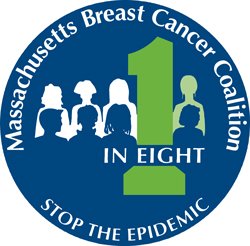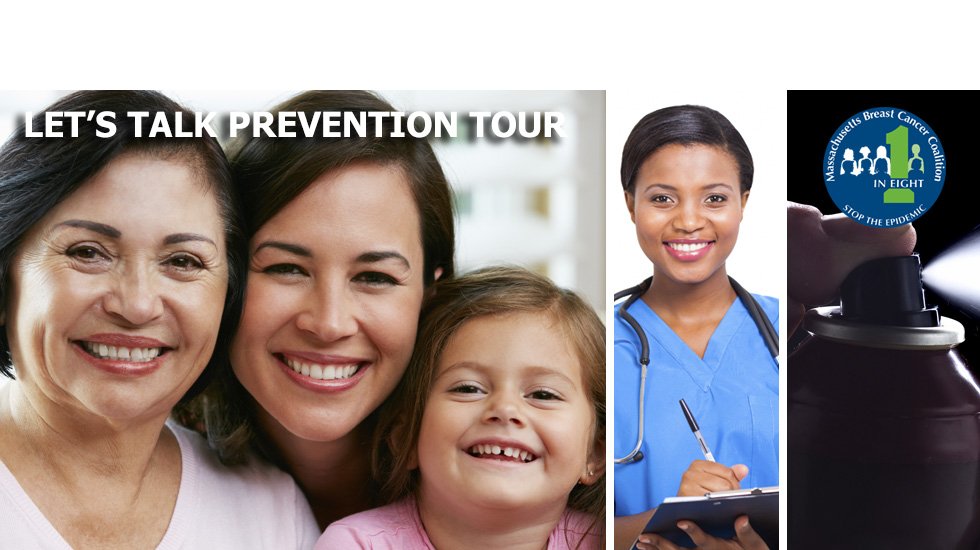Massachusetts Breast Cancer Coalition’s Let’s Talk Prevention: Reducing Toxic Exposures educational outreach materials, which empower discussions between health professionals and patients, started touring statewide in 2014.
This educational program is designed by Massachusetts Breast Cancer Coalition (MBCC) to facilitate discussions between health professionals and patients about environmental exposures and chemicals of concern. To help facilitate these discussions and make this important public health topic accessible, MBCC has created a one-of-a-kind booklet for health professionals and a medical brochure for patients.
The Let’s Talk Prevention: Reducing Toxic Exposures booklet for health professionals summarizes scientific evidence linking chemical exposure and their effect for many common chemicals of concern and suggests how to begin environmental health conversations with patients. The accompanying Let’s Talk Prevention: Reducing Toxic Exposures patient brochure – available in English, Spanish, Mandarin, Japanese, Portuguese, and Korean – describes basic steps for individuals and families to reduce problematic exposures and choose safer alternatives to toxic products. The goal of this program is to reduce toxic exposures in order to reduce the burden and cost of all environmentally-linked diseases, including breast cancer. MBCC is dedicated to preventing environmental causes of breast cancer through community education, research advocacy, and changes to public policy.
MBCC is currently scheduling tour visits statewide for the Let’s Talk Prevention program. The materials can be easily exhibited and displayed at hospitals, health centers, community centers, libraries, high schools, and colleges. The Let’s Talk Prevention: Reducing Toxic Exposure tour can be tailored to the specific needs of a community and can include: a community outreach table in a lobby/oncology office, an exhibition at a health and wellness fair, speaking engagements and lectures, special events, private events, and hospital staff meetings.
Dr. Patricia Raney, MD is a physician based on Cape Cod whose specialty is family medicine. Dr. Raney reflects on the value of MBCC’s Let’s Talk Prevention educational outreach and the intrinsic connection between breast cancer and our environment, “I am grateful that the Massachusetts Breast Cancer Coalition is starting this dialogue between health professionals and their patients through Let’s Talk Prevention: Reducing Toxics Exposure. The message that breast cancer is an environmental issue and that we must take steps to reduce our exposure to chemicals of concern is crucial to improving public health. It is with this understanding that I will work to share program materials with my patients to help them take steps to reduce their exposure to common chemicals linked to breast cancer and other diseases. I am very impressed with the booklet and the pamphlet, and this is an excellent and informative presentation that I look forward to sharing with my colleagues.”
This program is in direct response to several federal reports, from the President’s Cancer Panel, the Interagency Breast Cancer, and Environmental Research Coordinating Committee, which recommended increased attention to the link between environmental factors and disease, especially cancer. Additionally, information from the National Institute of Environmental Health Sciences supports actions to reduce toxic exposures. The burden of environmental linked diseases is often underestimated and not often discussed, even in medical programs.
Dr. Michael Misialek, Physician, Newton-Wellesley Hospital also had an opportunity to review the Let’s Talk Prevention materials: “As a physician at Newton-Wellesley Hospital, specializing in Anatomic and Clinical Pathology and Massachusetts Breast Cancer Coalition Medical Adviser, I’m very pleased to see the Let’s Talk Prevention: Reducing Toxic Exposures program develop as a resource for patient-doctor engagement. The value of such a program is not to be minimized. This program will provide much-needed information about reducing toxic exposures in daily life to physicians and patients alike. I look forward to promoting doctor-patient discussions concerning the link between health and toxic chemical exposures.”
If a hospital, health center, community center, library, high school, college, or private group has an interest in exhibiting the Let’s Talk Prevention educational materials, hosting a presentation about toxic exposures reduction, and sharing the materials, please e-mail cosimo@mbcc.org with the subject line, “Let’s Talk Prevention Tour.”
For more information about this important public health initiative and to see when the Let’s Talk Prevention tour will be coming to a location near you, please visit the Let’s Talk Prevention tour webpage.

